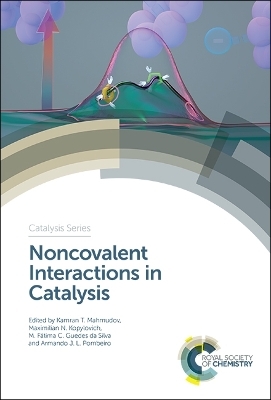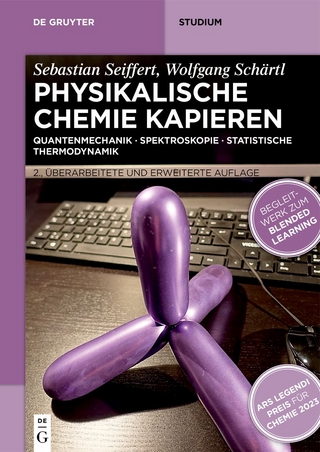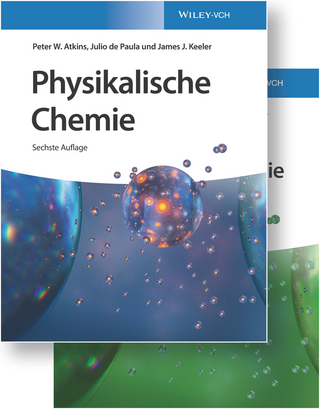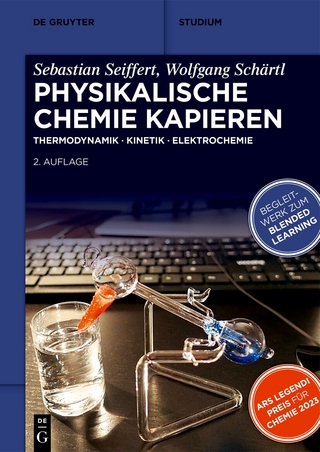
Noncovalent Interactions in Catalysis
Royal Society of Chemistry (Verlag)
978-1-78801-468-7 (ISBN)
Noncovalent interactions often provide the spine of biomolecular and material structures, and can therefore play a key role in biological and catalytic processes. Selectivity in chemical reactions, particularly in catalytic processes, is often an orchestral action of various noncovalent interactions occurring in intermediates and transition states. Although the role of hydrogen bonding is well explored in catalysis, the other types of weak interactions, namely cation–π, anion–π, π–π stacking, pseudo-agostic, halogen, chalcogen, pnictogen, tetrel and icosagen bonds, must also be considered. Naturally, the chemo-, regio- or stereoselectivity of a reaction depends on the stability of such noncovalent-interaction-supported species in catalytic systems. Therefore, an in-depth understanding of these weak interactions may be the key to designing new catalytic materials.
Providing an overview of the role of these different types of noncovalent interactions in both homogenous and heterogeneous catalysis, this book is a valuable resource for synthetic chemists who are interested in exploring and further developing noncovalent-interaction-assisted synthesis and catalysis.
Kamran T. Mahmudov received his B.Sc. (2001), M.Sc. (2003), Ph.D. (2007) and Habilitation (2013) degrees at the Baku State University, where he worked as an Assistant Professor (2006-2008). Since 2009, he has been conducting postdoctoral research under the supervision of Prof. A.J.L. Pombeiro at the University of Lisbon. His main research interests are related to the noncovalent interactions assisted synthesis and catalysis. Maximilian N. Kopylovich graduated in Chemical Engineering (1993) from Byelorussian State Technological University and completed his PhD degree in Chemistry (1998) at the same Institution. He is now a senior researcher at the Centro de Química Estrutural, Instituto Superior Técnico (IST), Universidade de Lisboa. His scientific interests lay mainly within synthetic coordination chemistry and catalysis. M. Fátima C. Guedes da Silva is Associate Professor, at Instituto Superior Técnico, Lisbon, Portugal. She is the Coordinator of the research group of Coordination Chemistry and Catalysis of the Centro de Química Estrutural, member of the Coordination Commission of this Centre and of the Directive Board of the Catalysis and Sustainability (CATSUS) PhD program. Her research centres on the synthesis, characterisation and application of novel coordination compounds. Armando J. L. Pombeiro is Full Professor at the Instituto Superior Técnico, Universidade de Lisboa, President of the Centro de Química Estrutural, Director of the Catalysis and Sustainability (CATSUS) PhD program, President of The College of Chemistry of the Universidade de Lisboa, Full Member of the Academy of Sciences of Lisbon and former President of the Portuguese Electrochemical Society. His research group investigates the activation of small molecules with industrial, environmental or biological significance.
Noncovalent Interactions in C–H Bond Functionalization;
Importance of C–H Hydrogen Bonding in Asymmetric Catalysis;
Catalysis by Networks of Cooperative Hydrogen Bonds;
Secondary (Agostic Si–H/Electrostatic C–F) Interactions in Alkaline Earth-based Catalysts;
Anion–π Catalysis;
Onium Ion-assisted Organic Reactions Through Cation–π Interactions;
The Role of Noncovalent Interactions in the Efficiency of Dendrimers in Catalysis;
Noncovalent Interactions in Hydrogenation and Hydroformylation;
Soft Forces in Organic Synthesis by C–N Coupling Reactions;
Noncovalent Interactions in the Design of Chiral Brønsted Acid Catalysts;
Noncovalent Interactions in the Nitroaldol (Henry) Reaction;
Noncovalent Interactions in Asymmetric Reactions Catalysed by Chiral Phosphoric Acids;
Baeyer–Villiger Oxidation Promoted by Noncovalent Interactions;
Noncovalent Interactionassisted Redox Catalysis in Reductive Dehalogenation;
Noncovalent Immobilization of Catalysts on Electrode Surfaces;
Noncovalent Interactions in Ionic Liquids;
Ionic Liquid Effect in Catalysed Multicomponent Reactions;
Noncovalent Interactions in Olefin Polymerization Catalysis Promoted by Transition Metals;
Influence of Noncovalent Interactions in Catalytic Ring-opening Polymerization Processes;
Cavity Effects in Metal–Organic Frameworks;
Cavity Effects in Metal–Organic Frameworks in CO2 Capture and Conversion;
Hybrids of Metal–Organic Frameworks as Organized Supramolecular Nano-reactors;
The Nature of Hydrogen Bonding in Adsorbed CO2 and H2O on Solid Amines in CO2 Capture;
Noncovalent Interactions of Biogenic Impurities with Transition Metal Catalyst Surfaces;
Mechanochemical Activation and Catalysis;
Role of Ion Pairing in the Mechanisms of Au(i)-catalysed Reactions: Theory and Experiment;
Noncovalent Interactions in Key Metal-centred Catalytic Intermediates: Structure– Electronic Relationship;
Noncovalent Interactions in Biocatalysis – A Theoretical Perspective;
Analysis of Reactivity from the Noncovalent Interactions Perspective
| Erscheinungsdatum | 20.03.2019 |
|---|---|
| Reihe/Serie | Catalysis Series ; Volume 36 |
| Verlagsort | Cambridge |
| Sprache | englisch |
| Maße | 156 x 234 mm |
| Gewicht | 1164 g |
| Themenwelt | Naturwissenschaften ► Chemie ► Physikalische Chemie |
| ISBN-10 | 1-78801-468-5 / 1788014685 |
| ISBN-13 | 978-1-78801-468-7 / 9781788014687 |
| Zustand | Neuware |
| Haben Sie eine Frage zum Produkt? |
aus dem Bereich


